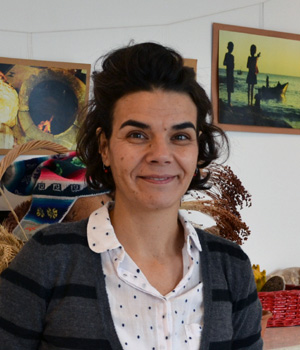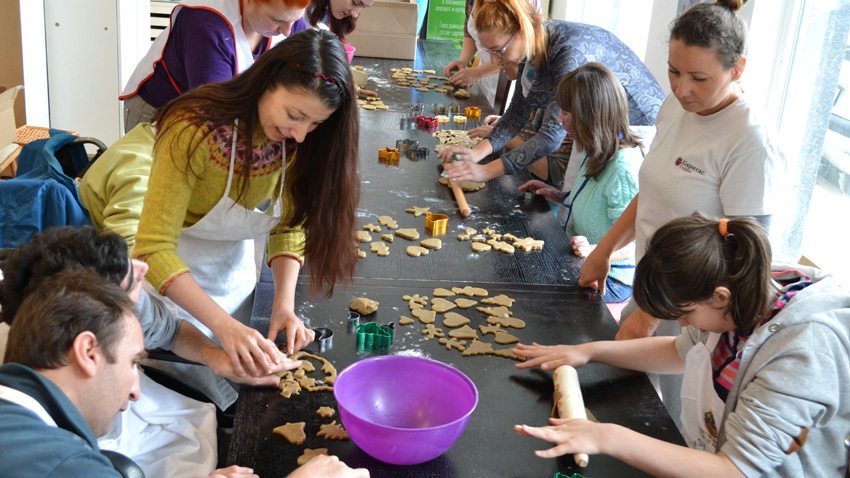Bread is a symbol of home, love and peace. It is a nutritious food, but can help us, too. We create a cozy and pleasant atmosphere for people through kneading, the project coordinator at the Bread Houses network Zdrava Vodenicharova told Radio Bulgaria. The network has been gaining popularity across Bulgaria with its bread therapy. The Bread Houses are innovative establishments which resemble community centers. Different groups of people with special needs, disabilities and difficulties are united through various creative methods based ondough kneading or confectionery. The network was founded by Dr Nadezhda Savova-Grigorova, a cultural anthropologist and researcher, whose interest in Bulgarian community centers turned into an inspiration. Currently there are eight Bread Houses in Bulgaria which bind people and bakeries from all parts of the globe. Radio Bulgaria witnessed a bread therapy in Bulgaria's capital Sofia held in NadEzhko bakery. Here is what Zdrava Vodenicharova told us about some of the network's most successful projects:
 “We provide Bread Building service to large companies and teams. As a result, they improve their teamwork. Our basic method is named Theatre of Breadcrumbs. The people make a performance on a given topic and take part in all stages of bread making. We bind each substance with a life metaphor and urge the participants to make their own association with that substance. For instance, when we add salt and sugar to our dough, we associate that process with the beautiful and the difficult moments of our lives. We have also invented a method of career guidance directed to students and pupils. The participants share their ambitions about their career development during kneading.We have launched other programmes as well. They are named Bakers without Borders and Bakeries without Borders. They help people from different regions exchange experience and bread recipes. However, Bread Therapy is our most important and most popular programme.”
“We provide Bread Building service to large companies and teams. As a result, they improve their teamwork. Our basic method is named Theatre of Breadcrumbs. The people make a performance on a given topic and take part in all stages of bread making. We bind each substance with a life metaphor and urge the participants to make their own association with that substance. For instance, when we add salt and sugar to our dough, we associate that process with the beautiful and the difficult moments of our lives. We have also invented a method of career guidance directed to students and pupils. The participants share their ambitions about their career development during kneading.We have launched other programmes as well. They are named Bakers without Borders and Bakeries without Borders. They help people from different regions exchange experience and bread recipes. However, Bread Therapy is our most important and most popular programme.”
The bread therapy is free of charge and is directed towards people with various disabilities, to women who became victims of domestic violence, to people from nursing homes and to refugees. This therapeutic method develops peoples' imaginations and social skills. It encourages communication between people and helps some groups integrate within the society.
 “We are working with three permanent groups of people with disabilities and also with refugees. Bread therapy develops fine motor skills and involves all human senses in the process. It calms people and they create art while shaping various forms of bread. The perception of those people that they can made their own bread or Christmas pastries is very precious to them, because they heard many times that they were incapable of doing certain things. We work with people with various disabilities. Some volunteers also joined the project. Aromatherapy is also very efficient. So far, we have worked with 5-6 groups of refugees. Several months ago we welcomed some Afghan women who were very good at kneading. They even taught us how to knead bread. Our main purpose is to make the refugees come out of their accommodation centers and present types ofbreadtypical of their home country. ”
“We are working with three permanent groups of people with disabilities and also with refugees. Bread therapy develops fine motor skills and involves all human senses in the process. It calms people and they create art while shaping various forms of bread. The perception of those people that they can made their own bread or Christmas pastries is very precious to them, because they heard many times that they were incapable of doing certain things. We work with people with various disabilities. Some volunteers also joined the project. Aromatherapy is also very efficient. So far, we have worked with 5-6 groups of refugees. Several months ago we welcomed some Afghan women who were very good at kneading. They even taught us how to knead bread. Our main purpose is to make the refugees come out of their accommodation centers and present types ofbreadtypical of their home country. ”
According to some of the people working under that project, that type of therapy is suitable for everyone who wants to get involved. Other projects were named Bread in the Dark, Kitchen Music, Bread Mathematics and Grammar and Bakeries of Peace. The Bread Houses have a social function as well. They employ people who experience difficulties in their lives.

Once you try the bread baked in some of the Bread Houses, you will find out that those products are extremely delicious and were kneaded with clean flour and yeast. They bear the nostalgic memories of our childhood when we used to wait in front of the local bakeries and usually ate half of the aromatic and tasty bread on our way back home. We remember our grandmothers saying: Bread shared with others is most delicious of all.
English version: Kostadin Atanasov
Photos: Luiza LazarovaBulgaria celebrates National Reading Day on the third Friday of November. The Reading Foundation is leading the initiative under the motto: “Read. For Real”. According to the OECD's PISA 2022 study, 53% of 15-year-old students in Bulgaria have..
On November 21–22, 2025, the 11th edition of the Career Fair will take place at the John Atanasov Hall in Sofia Tech Park. The forum aims to support early career orientation for young people in Bulgaria and is organized by the Bulgarian Global..
From fear and doubts to joy and support – Bulgarians react differently to the upcoming introduction of the euro on January 1, 2026. For some, it is a logical step towards Bulgaria’s integration into the EU with promises of stability..

+359 2 9336 661
